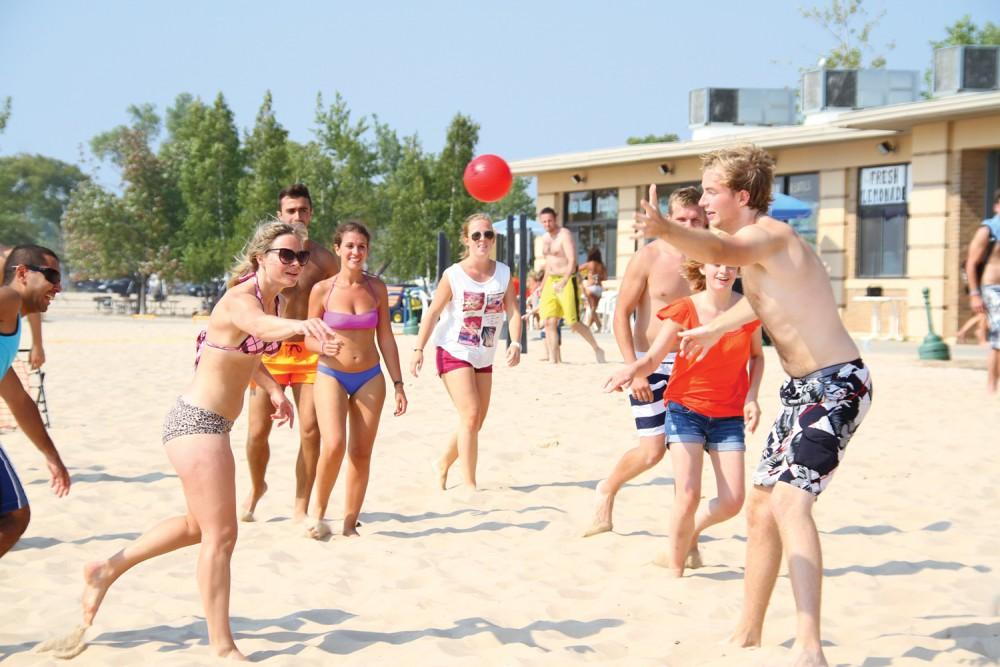Global Games to unite students through international sports

Courtesy / Alissa Lane International students playing tchoukball.
Sep 29, 2013
While Grand Valley State University offers both international students and American students
opportunities to get to know each other, many still have a hard time bonding across cultures. The
Global Games, which take place on Oct. 2 from 6 p.m. to 9 p.m. in the Fieldhouse, hopes to give
students a chance to mingle in a relaxed environment while becoming familiar with games from other
countries.
“It is going to be a great night of hopefully introducing gvsu students to new sports and new friends,”
said Kate Stoetzner, co-organizer and the director of international student and scholar services at the
Padnos International Center.
“Kate came to me over the summer with this idea for a game night, featuring games from all over the
world,” said Douwe Driehuis, who is an international student from the Netherlands and co-organizer.
“The night will include games that are new to American students like tchoukball and sports that are
fusions (of preexisting sports); games that normally don’t get a lot of attention (in the U.S.).”
Co-sponsored by Campus Recreation, Intramural sports and Campus Dining, the night will feature
demonstrations of international sports while giving students a chance to try them out. The event is lib
100/201-approved and is free and open to the public. International street food will be available to
students and can be purchased with a meal plan.
“I hope that participants become familiar with students from around the world,” Driehuis said.
The night will feature several sports that may be new to gvsu students, such as tchoukball, which is
similar to handball, and kabbadi, or wrestling. Ongoing games will play throughout the night on either
side of the Fieldhouse. In the center of the Fieldhouse, gvsu clubs such as the Capoeira Mandinga
Club, the Disc Golf Club and the Cricket Club will give demonstrations of their sports. Aside from
international sports, the night will also feature familiar games, but with a little variation. Games like
soccer will be played not with one ball, but with three: one for males, one for females and one for
both sexes.
One club sport that will be demonstrated is Capoeira. Originating from Brazil, the Afro-Brazilian art
form was recognized by Brazil as culturally significant in the 1930s. Since then, it has gained devoted
followings around the world, notably in Russia and Israel. Currently, there are six groups of Capoeira
organizations in Michigan.
“It’s basically Brazilian break-dance fighting,” club president Joe Bielecki said. “It’s not so much
focused on direct confrontation, but tricking your opponent. (Capoeira) is not like karate, which is very
direct strikes, very short strikes. It is played in a lot of circles (known as roda, participants often play
within a circle formed by other players) and works in a dance aesthetic.”
The sport is traditionally played to music provided by club members who play traditional instruments
such as the atabaque, a tall Afro-Brazilian hand drum.
At 7:40 p.m., a panel discussion featuring several international students will take place. Led by
Stoetzner, the students will answer questions about the cultural differences between American sports
and their native games.
Overall, the event is meant to unite both international and American students.
“I hope there’s a good crowd of both international and American students mixing,” Driehuis said.
“Right now, international students are kind of seen as a separate entity; Americans don’t know them
or haven’t taken time to get to know them.”
Sports are a way to build community.
“(The Global Games) will kind of be like the Olympics,” Driehuis said. “Hopefully relationships will be
formed. It’s a much more relaxed environment to get to know each other. ‘Oh, we’re playing games,
you have a funny accent, where are you from?’ It should be fun for everyone.”

























